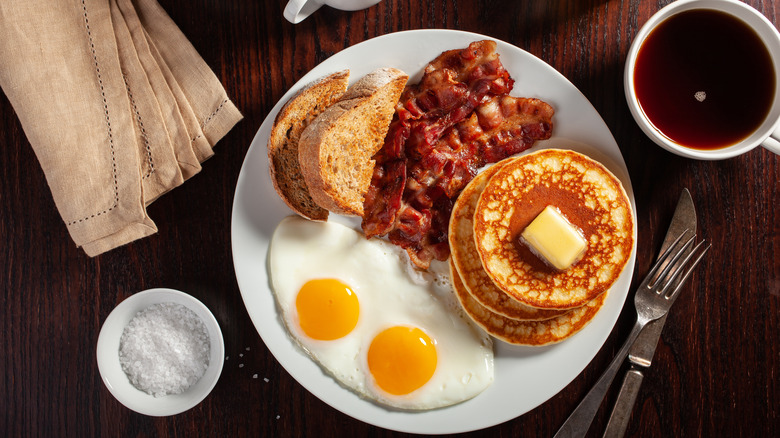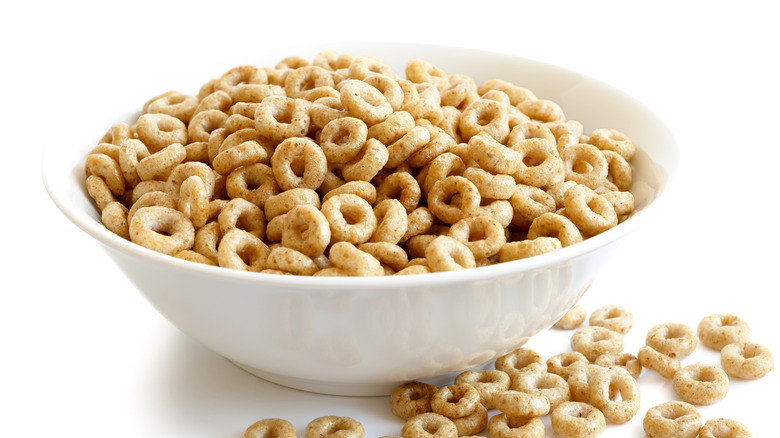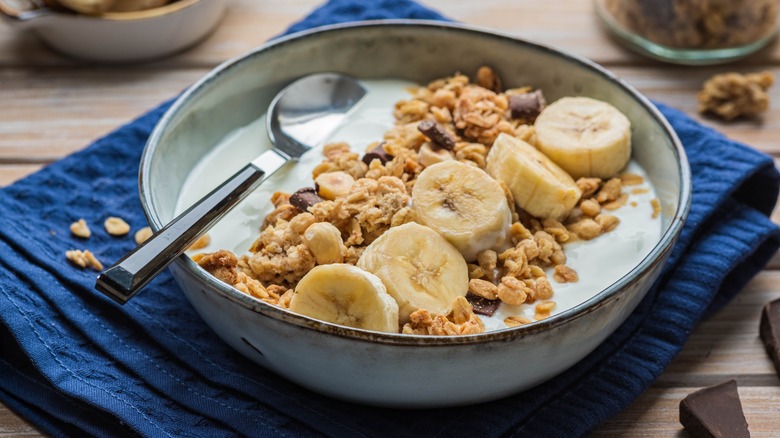Is Breakfast Truly 'The Most Important Meal Of The Day' Or Is It Just Clever Marketing?
Did you have breakfast today? If so, what did you have? Did you have a bowl of cereal and some toast? Did you have a doughnut and some coffee on the way to work? Or did you stop by your local diner and grab a big hearty breakfast? Whatever your answer may be, what matters is that you had breakfast this morning. It is, after all, the most important meal of the day ... or is it?
Whether you heard it from your parents, teachers, or pop culture, you've been told that breakfast is the most important meal of the day. Indeed, making the choice to grab some grub before you head out to school or work has its benefits. Johns Hopkins Medicine tells us that breakfast has many nutritional and physical benefits, such as giving you energy to start the day, controlling hunger, and keeping you focused on your tasks at hand. Most people won't say they feel their best in the morning until they've at least had a cup of coffee.
But is breakfast truly the most important meal of the day? It has its perks, for sure, and skipping it isn't a good idea. But as far as this notion that breakfast is the foundational meal of the day, where does that idea come from? The answer lies with an institution that has some unsurprisingly close ties with the breakfast market — the cereal industry.
General Foods used it to sell breakfast cereal
Have you ever had Grape-Nuts before? If you haven't, it's described as being made from wheat and barley and actually contains no grapes or nuts. While this cereal may only seem impressive because of its age, having been around for nearly a century, Grape-Nuts is unique in the fact that it helped make breakfast the so-called "most important meal of the day."
It was in 1944 that General Foods decided that it needed a better way to offload its stock of Grape-Nuts breakfast cereal. What the company needed was a way to get people to purchase more breakfast cereal — perhaps some kind of slogan or catchy message that would convince shoppers that they needed to buy breakfast foods. The slogan they settled on was one that they hoped would convince Americans about the importance of enjoying a full breakfast: "Breakfast is the most important meal of the day."
General Foods' campaign was so extensive that everything from radio advertisements to posters went up, all of them promoting the idea that if you "eat a good breakfast," you would "do a better job." Americans were being sold the idea that breakfast, whether it was a bowl of Grape-Nuts or a stack of pancakes, would not only lead to a better day, but a better "them" overall.
Today, the cereal industry still keeps a very close tab on breakfast, just as it did in the 1940s.
Breakfast cereal still plays a key role in selling breakfast
While we have long accepted the idea that breakfast is the most important meal of the day, that doesn't mean that the breakfast cereal industry (or "Big Cereal") hasn't let up on ensuring that Americans continue to fill their cereal bowls — and by extension, Big Cereal's pockets — for years to come.
Take, for example, Kellogg's breakfast cereal. One would think that selling something as simple and mundane as a box of Frosted Flakes wouldn't be too hard to accomplish. But you might be surprised to learn that Kellogg's spent an incredible $790 million dollars on marketing in 2021 alone, according to Statista. Compare this with General Mills' lavish spending of $690.1 million dollars on its advertisements and marketing in 2022. Both companies make products other than breakfast cereal, but these numbers still demonstrate that it takes quite a bit of spending to ensure that cereal remains at the forefront of every breakfast table.
According to a News and Tribune report, cereal companies pour huge amounts of money into trying to attract kids with their sugary breakfast cereals. In 2014, General Mills, Kellogg's, and Post all spent an average of more than $150 million each specifically on marketing sugar-heavy cereals to children. While many argue that promoting such sugary cereal to children is unhealthy, it's clear that cereal companies are doing whatever they can to remain the champion of breakfasts.
In the end, however, it's still good to always have a full breakfast each day — even if it's motivated by marketing.


